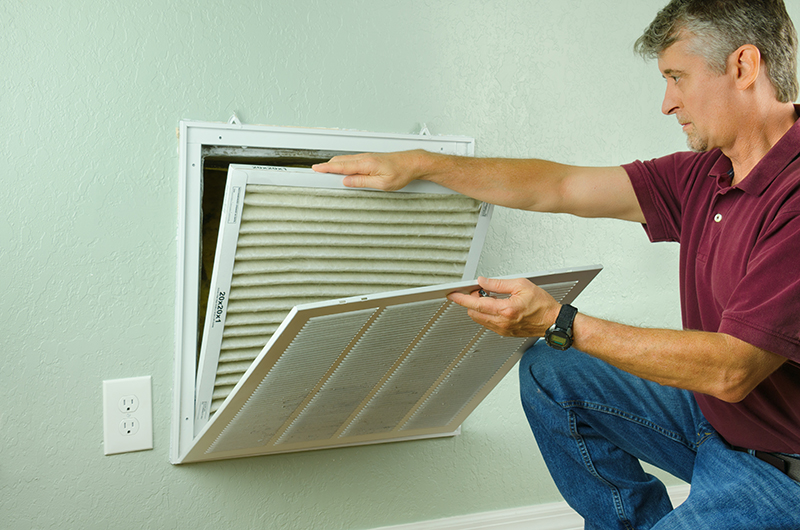No matter where you live, summer days are likely to call for air conditioning. One of the challenges of living in a warm climate is that warm air does a great job of holding on to humidity. Even if the external air is dry, warm air inside your home can start to feel sticky.
One of the simplest ways to protect your AC unit and your entire HVAC system is to replace the filter every month. This filter generally fits into the return air duct close to the blower. If your AC unit sits on a concrete pad outside, your filter frame may be very close to your furnace. The filter is likely behind the grill if your AC unit sits inside the window. It, too, should be checked and cleaned monthly.
The Role of AC Filters
AC filters allow air conditioners to run as efficiently as possible. If you’ve ever stood next to a central AC unit on a hot day, you know that these units are throwing off a lot of heat when running at their hardest. Making sure that either a window or a central AC unit is getting as much fresh air as possible is key to staying cool.
A dirty filter can limit the air your AC unit is getting. This means it must work even hotter than with a fresh, clean filter. Extreme heat can quickly kill an AC unit.
Dirty filters that are full of dust and pollen can also put people in danger. A neglected filter can become a haven for bacteria and even mold over time.
Signs Your AC Filter Needs Replacement
If your AC unit is working hard but not cooling your space, your AC filter may be clogged. You may also notice a musty or unpleasant odor in your home. Once your air conditioner has been starved of air, it can stop working altogether and start making strange noises.
How Often Should You Replace AC Filters?
Even top-quality AC filters are not expensive. Set a monthly reminder to change your AC filter to keep the air quality in your home as fresh as possible. This is especially important if anyone in your home struggles with allergies.
DIY vs. Professional Filter Replacement
A monthly filter replacement is generally an easy DIY project. Review the opening where the filter needs to go and note the size you’ll need, which is generally listed in inches. A 16×24 filter is 16 inches wide and 24 inches tall.
Purchase filters in lots of more than 1 to save on cost. When you load the last one, you can keep the wrapper as a reminder to buy another bundle. The more folds in the filter you choose, the more pollen and dust it will catch up. Just be careful not to buy a filter that’s too thick to fit into your return air bracket.
Consider hiring a skilled HVAC technician in the spring to clean and inspect your AC unit. Then, in the fall, bring them back to check your furnace.
The Cost of Neglecting Filter Replacements
A clogged filter can negatively impact the air quality in your home. A filter left loaded with dust will make your AC unit work harder than it has to and may eventually shorten its life.
Tips for Maintaining Clean Air Filters
In addition to changing out the filter monthly, do your best to keep dust and pet hair under control in your home. If pet hair is a challenge, make sure your vacuum is rated for pet hair and use it at least once a week.
Try not to let the temperature in your home run to extremes. Warm air is wet air; wet air leads to damp filters, which can lead to mold and bacteria growth.
Conclusion
Having a fresh filter every month can save you a lot of HVAC headaches. Invest in a wire-backed, heavily pleated filter if people in your home have allergies, COPD, or asthma. Remember that a filter change is not the same as a service; seasonal maintenance can keep your AC unit working well for years to come.
Need to get your HVAC system checked? Schedule a regular HVAC service with Thornton Heating and Cooling to keep your family comfortable.

